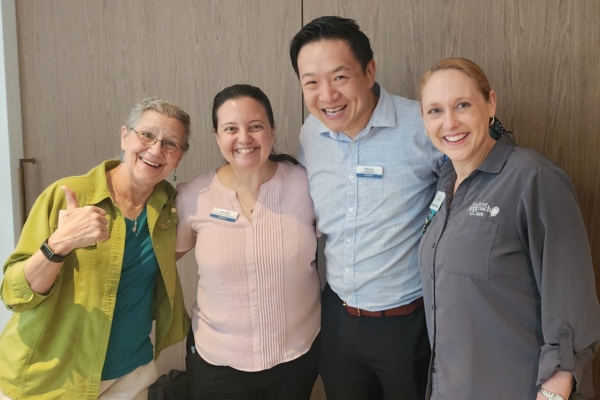Positive Approach to Care: Making a difference in the lives of residents living with dementia
By Janielle Jondral
Dementia Care and Engagement Advisor, Montefiore
Have you ever been to a training session that didn’t just teach you things, but completely blew your mind? Well, I recently attended one such session led by the international renowned dementia care expert, Teepa Snow. Her training was not just informative; it was a transformative journey that expanded my understanding and equipped me with invaluable skills.
Residing in Chapel Hill, North Carolina, Teepa has decades of hands-on caregiving experience in providing direct care in community and wellness centres, day programming sites, home care settings, assisted living, long-term residential care facilities, out-patient clinics, hospitals, hospice, and rehabilitation settings.
She first developed her Positive Approach to Care (PAC) early in her practice career and introduced it to others in continuing education workshops for nursing in the late 1980s. Her strategies and techniques “look at what is known about brain function and changes that happen with various conditions and integrate that information with therapeutic approaches.”
With Montefiore’s dementia care centred around small group, home-style environments where residents are empowered to live life in the way they choose, Teepa’s training aligns perfectly with what we are already doing, as well as encouraging us to work on continually evolving our approach to care.

One of the most enlightening aspects of Teepa’s training is her emphasis on seeing beyond the disease to the person within. She reminded us that people with dementia are individuals with their own stories, personalities, and dignity that should be respected. Instead of just trying to manage “behaviours,” she encouraged us to understand their needs by being more curious.
One particularly memorable aspect of Teepa’s training was her use of adult experiential learning techniques. We did role-play exercises and interactive activities that put us in the shoes of someone with dementia. These simulations were not just educational; they were profoundly impactful, fostering empathy and deepening our understanding in ways that words alone cannot convey.
By the end of the training, I wasn’t just pumped up—I was ready to take on the world. Teepa had given me practical skills and a whole new level of empathy that I knew would totally change how I approach dementia care. And she lit a fire in me—a passion to fight for person-centred care, to stand up for the dignity of every person, and to really make a difference in their lives.
Stay up to date
Subscribe to our newsletter to discover more about Montefiore